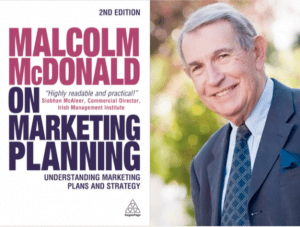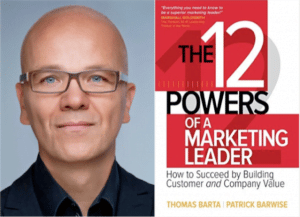By Kevin Anselmo
What percentage of CEOs trust their CMOs?
Think about it ……
Answer: not very many. In fact, it is just 20% according to a recent study by the Fournaise Marketing Group.
I learned this tidbit at a Triangle Marketing Club event from guest speaker Douglas Burdett, host of The Marketing Book podcast (one of my favorite podcasts out there). Burdett interviews marketing book authors every week, and in the presentation he shared some of the lessons he has learned from over 100 marketing books (here are the slides). I wanted to summarize some of these tips and show application for those working in higher ed or the research community.
1. Marketing Plans
 Whether you are in the process of putting together a marketing plan or if you have one in existence, then you might want to consider the marketing planning wisdom from Professor Malcolm McDonald, author of Malcolm McDonald on Marketing Planning. He notes two key questions to address:
Whether you are in the process of putting together a marketing plan or if you have one in existence, then you might want to consider the marketing planning wisdom from Professor Malcolm McDonald, author of Malcolm McDonald on Marketing Planning. He notes two key questions to address:
- What are you key target markets in order of priority?
- In your key target markets, what is your source of differential advantage?
One of the underlying points that Burdett recounted from his podcast interview with McDonald was the overemphasis on digital. To illustrate this, there is a cartoon in which the Chief Marketing Officer addresses the board and needs to answer why net profits are down by 30%. He says: “Yes, that is a pity, but the good news is that our likes on Facebook have doubled!”
The point is that an effective digital strategy is predicated on a winning strategy for markets and, in a higher education context, programs. We of course need to be on top of the latest developments in digital, but connect those to big overarching goals.
2. Experiences
Burdett highlighted an interesting statistic from Nicolas Webb’s book What Customers Crave: 70% of Americans are willing to spend more with companies they believe provide an excellent customer experience.
This is probably even more pronounced in a higher education context when you consider the impact of alumni, both in terms of donations and their impact on referring others. So from a marketing communications point of view, we need to think about how our activities foster the ideal experience for both students and alumni.
Burdett noted the following: the experience you give your customers is your most powerful marketing. I know we don’t like to refer to students as customers, but do consider “the experience” in your marketing communications. This can play out in various ways. Here are a few ideas.
- Monitor social media channels and set up other listening mechanisms so you are aware about any issues being communicated and can then proactively take steps to address them, working together with your colleagues.
- Involve students and alumni in your content. For example, think about doing research that involves your alumni from a particular segment and mobilize them to be your ambassadors to share the research with their networks.
- Measure the student experience and create communications to support it. As a reference point, take a look at Times Higher Education Group student experience survey and note the criteria the they use to measure satisfaction. We need to measure whatever the key differentiators are that drive the experience within program at our schools. We then need to make sure that we are communicating the different aspects that contribute to a positive student experience so there is optimal awareness.
If you might be questioning the investment in the above, remember two points from Webb’s book that can easily correlate to higher education:
– The probability of selling to a new prospect is less than 20%, while the probability of selling to an existing customer is 60 to 70 percent.
– On average, loyal customers are worth up to 10 times as much as their first purchase.
Both of these points are particularly noteworthy for marketing graduate programs to undergrads from the same institution.
3. Create Useful Content
This quote blew my mind – according to Alphabet (parent company of Google) chairman Eric Schmidt, we create as much information in two days now as we did from the dawn of man through 2003. Think about that!
There is so much content out there. We need to be deliberate, thoughtful and strategic in terms of how we create content to resonate with particular audiences. Burdett noted some principles from the following authors:
- Audience by Jeffrey K. Rohrs. Build and keep an audience before trying to sell them.
- They Ask You Answer by Marcus Sheridan. Answer your prospects questions in your marketing. Sheridan lived this out for his pool company by simply publishing an answer to every question he ever received, which helped transform his company.
What are the questions prospective students, current students and alumni ask that can be integrated into your content marketing?
- Buyer Personas by Adele Revella. Create archetypes of real buyers. Then devise strategies to promote products and services to these people.
4. Big Picture Thinking
 Burdett concluded his talk by referencing Thomas Barta and Patrick Barwise’s book The 12 Power of a Marketing Leader. Barta noted the following: “Our interviews with the most successful marketers have one thing in common: a top management viewpoint. The real marketing leaders were concerned with one thing: how marketing helps the company achieve its biggest priorities.”
Burdett concluded his talk by referencing Thomas Barta and Patrick Barwise’s book The 12 Power of a Marketing Leader. Barta noted the following: “Our interviews with the most successful marketers have one thing in common: a top management viewpoint. The real marketing leaders were concerned with one thing: how marketing helps the company achieve its biggest priorities.”
Substitute the word “institution” for “company” in the quote above and I believe this quote has significant relevance for those working in marketing communications in a higher education context.
As a final point, it is vital that we are continually learning about the latest in marketing communications. It is an ever-changing space and we need to be on top of our games, both for us as professionals as well as to benefit our institutions. On that note, consider listening to the Marketing Book Podcast (and other such podcasts).
Kevin Anselmo is the Founder of Experiential Communications. He is the author of The Higher Ed Marcom Assessment and Maximize Your Impact – How Academics Can Communicate Knowledge Through Traditional and Digital Media.
